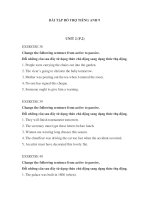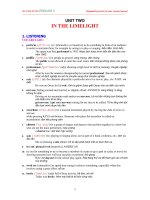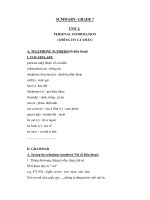Unit 2 schooling
Bạn đang xem bản rút gọn của tài liệu. Xem và tải ngay bản đầy đủ của tài liệu tại đây (567.08 KB, 34 trang )
Unit 2: SchoolingPrivate school
Discuss these questions
1. Does every child have to go to school at
the same age at present?
2. Is schooling compulsory for all children in
VN?
3. What are the two school systems in VN?
4. Which school can parents sent their
children to?
5. Is homeschooling popular in Vietnam?
Task 1: Read the text and choose the main
idea for each paragraph (1-4).
The reason for home schooling
School attendance
Home schooling-not a good alternative.
Schooling-Study and break
Task 1: Read the text and find the headings in
the appropriate paragraphs (1-4).
1. School attendance
2. Study and break
3. The reason for home schooling
4. Home schooling-not a good alternative.
School attendance
Study and break
Socialize (v)
Concern (v/n)
Data (n)
require (v)
pressure (n)
compulsory (adj)
curriculum (n)
Extreme (n/adj)
Mandatory (adj)
Vocabulary
Enrol / enrolment
Religious (adj)
Disability(n)
Participate (v)
Contrary (v)
hamper (v)
Task 2: Choose the words given to fill in the
sentences:
extreme, socialize, concern, data, require,
pressure, compulsory, curriculum
1. Last year I attended a …………….
development in Bangkok
2. This work …………….a good
knowledge of deep sea life
3. He was once terribly shy , but now he’s
gone to the opposite …………….
curriculum
requires
extreme
4. If you go to this party, you will have a good
opportunity to …………. with your new
colleague.
5. Is military service ……………. in your
country?
6. He was not able to get enough
…………….for his research.
7. She left home to escape the …………….in
her family’s formal life
8. Our main …………….is that they are not
receiving enough help.
socialize
compulsory
data
pressure
concern
Task 3: Look at the text again and say whether the
statements true (T), false (F) or not given (NG).
1. Every child in the states has to go to school at
the same age.
2. Children can leave school at 16 only when they
have health problems.
3. As many students enroll in public schools as
they do in private ones.
4. Like every other nation, the States allow a
summer break of two and a half months.
5. Not as much as 5% of parents educate their
children at home.
F
NG
F
F
T
6. some parents feel that they can work out a
more suitable curriculum for their children.
7. Parents who choose to educate their own
children at home sometimes met and help each
other with the education of their children.
8. One opposition to home schooling is the
concern that children would not have sufficient
facilities at home for their study.
9. Teachers’ organizations are not in favour of
home schooling.
10. Children with home schooling may lose their
chance to socialize with their peers.
T
T
NG
NG
T
Task 4: Read the text again and answer the
questions.
1. What is usually the school age for children in
the United States?
2. Does every state in the United States have the
same requirements for the age at which children
can leave school?
3. What kind of school has a bigger student
enrolment, public or private schools?
From 5 -6 to 16 -18
No, they don’t
Public schools
4. Why did students in the United States originally have a long
summer break?
5. Name one reason that makes parents choose to educate their
children at home.
6. Name one argument that people give against home schooling.
It allowed student to participate in the harvest period during
the summer.
They think that the native social pressures of schools are
bad for their child’s development.
They think that removing children from the school
environment could hamper their ability to socialize with their
peers.
Find from the text equivalents from the
following Vietnamese words and phrases
1. giáo dục bắt buộc:
2. trường công:
3. trường tư:
4. các số liệu của chính phủ:
5. Số lượng học sinh ghi danh học:
Compulsory education/
schooling
State school
Private school
Government data
Student enrolment
6. giai đoạn nghỉ hè:
7. tham gia các hoạt động trên lớp
8. thiết kế chương trình học:
9. áp lực trường học:
10. sự phát triển của một đứa trẻ :
Summer break period/ summer vacation
to participate in class/ school activities
Tailor/ design a curriculum
Pressure of school
A child’s development
Speaking: Work in pairs and ask questions about
schooling in Viet Nam
1. When does mandatory education start in
Vietnam? How long is it?
2. Does the government require a certain age at
which children can leave school?
3. Is private school popular in Vietnam? Which
attracts more students, public or private school?
Why?
4. Do you have home schooling ? If yes, why do
some parents choose to do it? And why?
5. “ Education should be compulsory for children”
Give your opinion about it?
6 .When can students take the GCSE examination?
Education should be compulsory?
Compulsory education is education that is
required by law.
Compulsory education means the students don’t
have to pay tuition fees. It is also the children’s
right in which the state must have responsibilities
for that in order to improve people’s standard
culture, create standard human resources.
Schooling makes children engage in real
tasks with meaningful benefits of the work
they do, and they can have a choice in
what they do.
Going to school can give the children
opportunities to socialize with the others.
Education helps built ideas in one’s mind,
without basic education even an intelligent
child would not be able to develop his full
potential.
Task 2: Work in groups make up the questions
and give the answer about schooling in
Vietnam using the cues
1. When/ children/ Vietnam/ start/ compulsory
education?
……………………………………………
2. How many terms / a school year/ in
Vietnam?
………………………………………………
3. How many kind/ school / there / in Vietnam?
………………………………………………
When do children in Vietnam start their compulsory education?
How many terms are there in a school year in VN?
How many kinds of school are there in VN?









